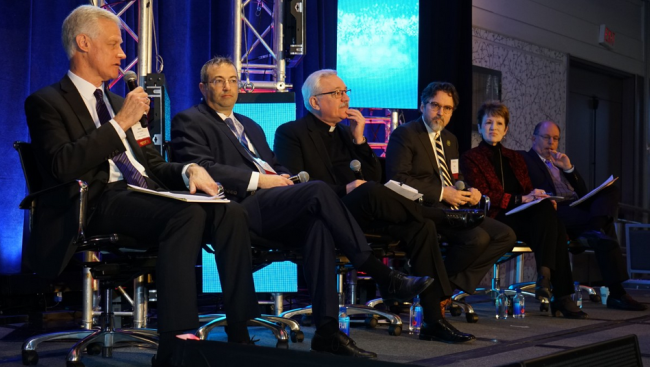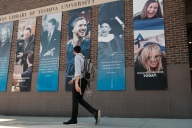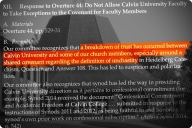You have /5 articles left.
Sign up for a free account or log in.

The ecumenical presidential panel. From left: Brigham Young University's Kevin J. Worthen, Yeshiva University's Ari Berman, Regis University's John Fitzgibbons, Zaytuna College's Hamza Yusuf, Houghton College's Shirley Mullen and moderator Peter Wehner.
Courtesy of Council of Christian Colleges and Universities
WASHINGTON -- Leaders of religious colleges made a case for faith-based education at the Council for Christian Colleges and Universities Presidents’ Conference and addressed concerns about how religious higher education is viewed by the wider public.
Speakers at the meeting of the council -- all of whose members subscribe to the view that sexual relations should be limited to marriage between a man and woman -- spoke about the need to preserve a space within the American higher education landscape for their brand of education.
At one point in the conference, a questioner cited the backlash to the news that Karen Pence, wife of vice president Mike Pence, teaches in a Christian school that bars LGBTQ students and teachers in asking whether there is growing intolerance to faith-based education. The irony, of course, is their institutions are often the ones viewed as intolerant for rules -- not universal in Christian education -- like those in the school where Karen Pence teaches.
But while the CCCU institutions are increasingly out of step with growing support in the larger society for LGBTQ rights, for the moment, at least, no court or government agency is trying to close them or force them to change their policies. And they have a friend in the U.S. Department of Education.
Speaking on Friday, Diane Auer Jones, the principal deputy under secretary of education, said the department’s ongoing negotiated rule-making process to rewrite rules for accrediting agencies is “a rule-making effort that is designed to respect and honor missions of institutions … Regardless of what the mission of the institution is, I think our rule-making path is really focused on respecting that mission, honoring that mission and making sure that through the accreditation process and the evaluation of outcomes we are always measuring against that mission.”
Jones added, “There are elements of our regs that focus on faith-based mission, making sure that institutions do not find that accreditation is difficult because of the faith-based mission, making sure that accreditation regs are not superimposing upon you expectations around hiring practices, around student life that are counter to the tenets of faith-based institutions but potentially popular in the world at large.”
"It's not a change in regulations. It's not a change in law. It's a reaffirmation," Jones said.
In one session at the CCCU conference, leaders of colleges representing a variety of faith traditions -- Jewish, Mormon, Muslim, Protestant and Roman Catholic -- spoke about the value of faith-based education. While leaders from these colleges all shared the same stage for the discussion, it’s worth noting that colleges from these various traditions can have very different policies regarding faculty and student life. For example, while the Protestant institutions in the CCCU limit faculty and staff hiring to “only persons who profess faith in Jesus Christ” and require students to sign covenants agreeing not to engage in sexual relations outside of marriage between a man and a woman, Roman Catholic colleges generally do not have such restrictions on hiring or student conduct.
Yet what leaders of the institutions shared was a commitment to the value of a holistic, faith-based approach to education.
“We need to do all we can to affirm the value of faith-based higher education, to keep that as part of the diversity of the world of American higher education,” said Shirley Mullen, the president of Houghton College, a Christian institution in New York. “All of us today in our own ways have spoken about this kind of education that does not require students to leave behind their fundamental moral and spiritual convictions as they deepen their intellectual understandings. These are educational frameworks that do not artificially separate questions of fact from questions of value, they do not artificially separate cognitive matters from the affections and the role of the will. We’re all about an education that invites the integrated development of the whole human being, that subjects every aspect of human development, including their faith, to the discipline of appreciative and critical reflection.”
Hamza Yusuf, the president of Zaytuna College, a Muslim liberal arts college in California, described what he saw as a growing hostility toward religion within secular higher education. “For religious people, the secular institutions have become increasingly hostile to religion,” Yusuf said. “Faith-based people find themselves often confronted by professors that are aggressively anti-theistic, anti-religious, and put forward the idea that somehow religion is superstition. This belies the fact that all of the great traditions of the world were deeply committed to reason.
“For me, just having safe places where people that actually are devotional can come to and not be offended by [having] their sensibilities attacked, I think that’s extremely important,” Yusuf said.
The Reverend John P. Fitzgibbons, the president of Regis University, a Jesuit university in Colorado, said he thinks the university “needs to be a sacred space. That is not a throwaway word. What happens in the university is that human beings become what God intends us to be.
“The university is the place where the personal, the consummately personal, and the structural are examined together,” Father Fitzgibbons said. “It is an enormous mistake to excise or cut out faith from public conversation … If you don’t bring the deepest parts of your being to the conversation with others -- that is rigorous and challenging and profoundly difficult -- if you don’t do that, the deepest part of what it means to be human is not in the conversation.”
“I see this moment in time as a moment of opportunity for religion or faith,” said Rabbi Ari Berman, the president of Yeshiva University, a Jewish institution in New York. “I look at the world and the way things are analyzed or thought about, I see that there’s place for us now that is profound and necessary.”
Rabbi Berman referred to a center at the Massachusetts Institute of Technology where researchers recently grappled with the question of how to resolve the famous “trolley car problem” in relation to self-driving cars -- how they should be programmed to respond to situations in which there are two options, both of which will result in fatally striking a person or group of people.
“How did they resolve one of the great philosophical challenges or ethical issues of our time?” Rabbi Berman asked. “They took a survey.”
“They took a survey,” he said, seemingly disbelievingly. “We come with a 3,000-year-old tradition of wisdom, of texts, of substance, of ideas, of values, of nuance. And we bring that to contemporary issues and challenges and we are able to speak with weight.”








